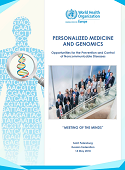Personalized medicine and genomics - Opportunities for the prevention and control of noncommunicable diseases (2020)

Download
Saint Petersburg, Russian Federation, 14 May 2018
The World Health Organization, with support from the Russian Federation, organized a seminar to explore the role of personalized medicine (PM) in the prevention and control of noncommunicable diseases (NCDs) and its relevance to the Russian Federation. The seminar took place on 14 May 2018 at the Almazov National Medical Research Centre in Saint Petersburg, Russian Federation.
PM is “a medical model using characterisation of individuals’ phenotypes and genotypes for tailoring the right therapeutic strategy for the right person at the right time, and/or to determine the predisposition to disease and/or to deliver timely and targeted prevention”. This approach can use genetic or other biological information about an individual to (for example) identify people at higher inherited risk of a disease or those who are most likely to respond to treatment and/or experience side effects.
There has been tremendous progress in this field in recent decades and there is exciting potential for PM approaches to be applied to prevention and control of NCDs across Europe in the future. However, a number of challenges to the integration of this model into health systems remain. Several strategies are proposed to help governments address these challenges and to ensure appropriate use of PM for NCD response in inclusive, sustainable health systems.



